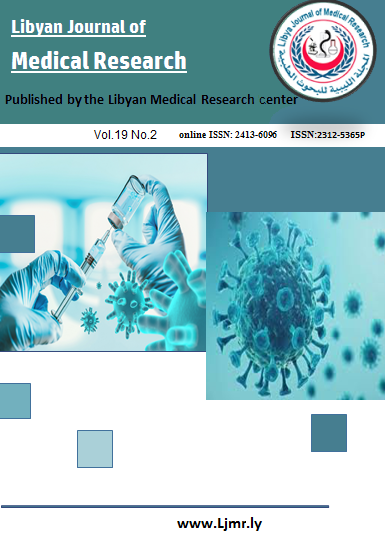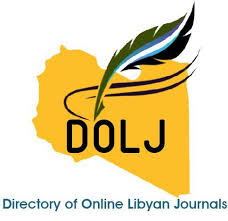Assessment of the Physicochemical and Microbiological Groundwater Quality in the Jennawen, Shakshouk, and Jadu Agricultural Project Areas, Jadu City, Libya.
DOI:
https://doi.org/10.54361/LJMR.19.2.29Keywords:
Groundwater quality, Jennawen, Libya, E. coli, Water standardsAbstract
Background In arid regions such as Jennawen, Libya, groundwater is the primary source for drinking and irrigation, yet it is highly vulnerable to geogenic and anthropogenic contamination. This study aimed to assess the chemical and microbiological quality of 26 groundwater samples from wells and springs, including desalinated water. Material and Methods Physicochemical parameters (e.g., pH, salinity, major ions) and microbiological indicators (total coliforms, E. coli, total bacterial counts) were analyzed according to established guidelines. Results revealed that most untreated groundwater samples exceeded the permissible limits for salinity, hardness, and sodium. Furthermore, widespread bacterial contamination was identified, posing significant health risks. While desalinated water was free from microbiological contaminants, it was severely deficient in essential minerals. Conclusion: the groundwater in the Jennawen region requires urgent attention. Balanced water management strategies are critically needed to address both chemical and microbial contamination while maintaining an optimal mineral balance in potable water.
Downloads
References
1. Aldeeb, W, Mustafa, A, Ahmed, A, Aldeeb, B and Algeidi, O (2023). Evaluation of Groundwater for Drinking in Alghurayfah Municipality, Libya. The Fourth Engineering Conference "Renewable Energies and Confronting Climate Change to Achieve Sustainable Development" 12-13/12/2023.
2. Alzayani, A, Abuzreda, A, Zew, I.N, Abdulrahman, S.A and Shomata, M.M. (2024).Study of the Quality of Bottled Drinking Water Available in the Local Market of Benghazi City, Libya .J Earth Environ Waste Manag, 2(3), 1-9.
3. Negrete .J.M , Uribe. R.P., Montes. G.E Arango. J.H., Pinto. M.R ,Contreras.J.O , Hernandez. J.P. (2024). Groundwater quality assessment in the La Mojana region of northern Colombia: implications for consumption, irrigation, and human health risks. Applied Water Science (2024) 14:96https://doi.org/10.1007/s13201-024-02156-9
4. Sadat-Noori, S. M,Ebrahimi, K., Liaghat, A. M (2013). Groundwater quality assessment using the Water Quality Index and GIS in Saveh-Nobaran aquifer, Iran . Environmental Earth Sciences, DOI 10.1007/s12665-013-2770-8
5. Elyaagubi, F. K, ELNakeib. S.M.,Alrabib. M.A. and Abouzed. A (2019) Assessment of Groundwater Pollution in Different Locations of Al-khums City, Libya. University Bulletin, 21 (5),1.
6. Abeish. A.M and Said. O.A. (2020). Assessment of Groundwater Quality of Assabaa Region, Libya. The Sixth International Conference - Smart Cities, Bright Star University, Libya, December 2020.
7. Shahina. S.K.J, Sandhiya. D and Rafiq. S (2020). Bacteriological Quality Assessment of Groundwater and Surface Water in Chennai. Nature Environment and Pollution Technology, An International Quarterly Scientific Journal, 19(1), 349-358.
8. Keesari. T Ramakumar. K.L, Prasad M. B. K,Chidambaram. S, Perumal. P., Prakash. D and Nawani. N (2015). Microbial Evaluation of Groundwater and Its Implications on Redox Condition of a Multi-Layer Sedimentary Aquifer System. Environ. Process. (2015) 2:331–346 , DOI 10.1007/s40710-015-0067-5
9. Stanley. J (2019). GROUNDWATER CHEMISTRY AND MICROBIOLOGY IN A WET-TROPICS AGRICULTURAL CATCHMENT. Master of Philosophy thesis, School of Earth, Environmental and Biological Sciences, Science and Engineering Faculty. Queensland University of Technology.
10. Ali S Verma. S Manish Baboo Agarwal. M.B Islam. R Manu Mehrotra. M, Rajesh Kumar Deolia. R.K., Kumar. J Singh. S Ali Akbar Mohammadi. A.A, Raj. D., Gupta. M.K, Dang. P and Fattahi. M (2024). Groundwater quality assessment using water quality index and principal component analysis in the Achnera block, Agra district, Uttar Pradesh, Northern India. Scientific Reports, 14:5381
11. Ben sera. A ,Alzughoul. K and Masoud. M (2021) .Hydrogeochemistry of groundwater aquifers in Azintan, Northwestern Libya . AL Jabal Scientific Journal, (3), 141 .
12. Ali. S, Ali. A, Khaleefah. R, Salih. S, Emran. R, Al.Diab. A and Othman. K (2024) . Chemical and Microbial Analysis of Commercial Bottled Drinking Water Available in Surman City Markets. Libyan Medical Journal, 16(2);111-118 .
13. Al-Barakah. F,N, Al-jassas. A.M and Aly. A.A (2017) . Water quality assessment and hydrochemical characterization of Zamzam groundwater, Saudi Arabia . Applied Water Science, 7:3985–3996 .
14. Edeeb.Wand Algeidi.O (2021) .Assessment of Ground Water Quality through WQI in Mitrid, Libya .
15. Abd El-Aziz. S. H (2018) .. Application Of Traditional Method And Water Quality Index To Assess Suitability Of Groundwater Quality For Drinking And Irrigation Purposes In South-Western Region Of Libya. Water Conservation and Management, 2(2) : 20-30.
16. Shaltami.O.R, Fares.F.F, Alfaitory.M.S, El Oshebi.F.M, Gawili.H, Aljazwi.M.S and Habibi.I (2022) . Ground Water Quality Assessment for Drinking and Irrigation Purposes of Tazerbo Well Field, Libya, Line 500 ,
17. He was.A.M, Alakhdar.E.M and Asar.R.M (2022) . STUDY OF SOME PHYSICAL AND CHEMICAL PROPERTIES OF WATER THAT GOES IN, THEN OUT OF THE DESALINATION PLANT AT AL-KHUMS CITY. International Journal of Advanced Research (IJAR) , 10 (01), 956-959 . http://dx.doi.org/10.21474/IJAR01/14130
18. MEENA.K.S, GUNSARIA.R.K, KANTA MEENA, KUMAR.N and MEENA.P.L (2012) . THE PROBLEM OF HARDNESS IN GROUND WATER OF DEOLI TEHSIL (TONK DISTRICT), RAJASTHAN . Journal of Current Chemical and Pharmaceutical Sciences, 2(1), 2012, 50-54 . ISSN 2277-2871 .
19. Hamdan.M andIessa.K.R R. (2024) . Assessment of the groundwater quality in Sebha, Libya, for drinking purposes . Journal of Appropriate Technology for Agriculture, Environment, and Development , vol.2, N.1, October 2021, E-ISSN:3031-0903 .https://doi.org/10.62671/jataed.v2i1.53 .
20. Masood, M.U.; Rashid, M.; Haider, S.; Naz, I.; Pande, C.B.; Heddam, S.; Alshehri, F.; Elkhrachy, I.; Ahsan, A.; Sammen, S.S. RETRACTED: Exploring Groundwater Quality Assessment: A Geostatistical and Integrated Water Quality Indices Perspective. Water 2024, 16, 138. https://doi.org/10.3390/w16010138 .
21. Traoré, O.; Kpoda, D.S.; Dembélé, R.; Saba, C.K.S.; Cairns, J.; Barro, N.; Haukka, K. Microbiological and Physicochemical Quality of Groundwater and Risk Factors for Its Pollution in Ouagadougou, Burkina Faso. Water 2023, 15, 3734. https://doi.org/10.3390/w15213734 .
22. Elmabrok. F. M (2017) . Evaluation of Ground Water quality and Suitability for Drinking purposes in Alagilat Area, Libya . American Journal of Engineering Research (AJER), Vol. 6, Issue-6, pp 16-23, 2017. e-ISSN: 2320-0847 p-ISSN : 2320-0936 .
23. Aldeeb.W.A and Aldabusi.B.M (2023) . Ground Water Quality Evaluation for Drinking Purposes in Sabratha City, Libya . Scientific Journal for the Faculty of Science-Sirte University Vol. 3, No. 1 (2023) 29-34 .https://doi.org/10.37375/sjfssu.v3i1.102.
24. Osman, G.A., Kamel, M.M., Hassan, H.M. and Al-Herrawy, A.Z (2011) . Microbial Quality of Nile Water and Drinking Water in Some Areas of Greater Cairo, Egypt . Australian Journal of Basic and Applied Sciences, 5(11): 1328-1334, 2011 ISSN 1991-8178 .
25. Javaid.M, Qasim .H, Zia.H.Z , Bashir.M.A,Qayyoom.A, Hameed.S.A, Samiullah.K, Hashem.M, Morsy. K , Bin Dajem.S, Muhammad.T, Shaheen. M, Ali. M. Y, Saeed. M, Alasmari. A , Alshehri .M .A (2022) . Bacteriological composition of groundwater and its role in human health .Journal of King Saud University – Science 34 (2022) 102128 .
1. Aldeeb, W, Mustafa, A, Ahmed, A, Aldeeb, B and Algeidi, O (2023). Evaluation of Groundwater for Drinking in Alghurayfah Municipality, Libya. The Fourth Engineering Conference "Renewable Energies and Confronting Climate Change to Achieve Sustainable Development" 12-13/12/2023.
2. Alzayani, A, Abuzreda, A, Zew, I.N, Abdulrahman, S.A and Shomata, M.M. (2024).Study of the Quality of Bottled Drinking Water Available in the Local Market of Benghazi City, Libya .J Earth Environ Waste Manag, 2(3), 1-9.
3. Negrete .J.M , Uribe. R.P., Montes. G.E Arango. J.H., Pinto. M.R ,Contreras.J.O , Hernandez. J.P. (2024). Groundwater quality assessment in the La Mojana region of northern Colombia: implications for consumption, irrigation, and human health risks. Applied Water Science (2024) 14:96https://doi.org/10.1007/s13201-024-02156-9
4. Sadat-Noori, S. M,Ebrahimi, K., Liaghat, A. M (2013). Groundwater quality assessment using the Water Quality Index and GIS in Saveh-Nobaran aquifer, Iran . Environmental Earth Sciences, DOI 10.1007/s12665-013-2770-8
5. Elyaagubi, F. K, ELNakeib. S.M.,Alrabib. M.A. and Abouzed. A (2019) Assessment of Groundwater Pollution in Different Locations of Al-khums City, Libya. University Bulletin, 21 (5),1.
6. Abeish. A.M and Said. O.A. (2020). Assessment of Groundwater Quality of Assabaa Region, Libya. The Sixth International Conference - Smart Cities, Bright Star University, Libya, December 2020.
7. Shahina. S.K.J, Sandhiya. D and Rafiq. S (2020). Bacteriological Quality Assessment of Groundwater and Surface Water in Chennai. Nature Environment and Pollution Technology, An International Quarterly Scientific Journal, 19(1), 349-358.
8. Keesari. T Ramakumar. K.L, Prasad M. B. K,Chidambaram. S, Perumal. P., Prakash. D and Nawani. N (2015). Microbial Evaluation of Groundwater and Its Implications on Redox Condition of a Multi-Layer Sedimentary Aquifer System. Environ. Process. (2015) 2:331–346 , DOI 10.1007/s40710-015-0067-5
9. Stanley. J (2019). GROUNDWATER CHEMISTRY AND MICROBIOLOGY IN A WET-TROPICS AGRICULTURAL CATCHMENT. Master of Philosophy thesis, School of Earth, Environmental and Biological Sciences, Science and Engineering Faculty. Queensland University of Technology.
10. Ali S Verma. S Manish Baboo Agarwal. M.B Islam. R Manu Mehrotra. M, Rajesh Kumar Deolia. R.K., Kumar. J Singh. S Ali Akbar Mohammadi. A.A, Raj. D., Gupta. M.K, Dang. P and Fattahi. M (2024). Groundwater quality assessment using water quality index and principal component analysis in the Achnera block, Agra district, Uttar Pradesh, Northern India. Scientific Reports, 14:5381
11. Ben sera. A ,Alzughoul. K and Masoud. M (2021) .Hydrogeochemistry of groundwater aquifers in Azintan, Northwestern Libya . AL Jabal Scientific Journal, (3), 141 .
12. Ali. S, Ali. A, Khaleefah. R, Salih. S, Emran. R, Al.Diab. A and Othman. K (2024) . Chemical and Microbial Analysis of Commercial Bottled Drinking Water Available in Surman City Markets. Libyan Medical Journal, 16(2);111-118 .
13. Al-Barakah. F,N, Al-jassas. A.M and Aly. A.A (2017) . Water quality assessment and hydrochemical characterization of Zamzam groundwater, Saudi Arabia . Applied Water Science, 7:3985–3996 .
14. Edeeb.Wand Algeidi.O (2021) .Assessment of Ground Water Quality through WQI in Mitrid, Libya .
15. Abd El-Aziz. S. H (2018) .. Application Of Traditional Method And Water Quality Index To Assess Suitability Of Groundwater Quality For Drinking And Irrigation Purposes In South-Western Region Of Libya. Water Conservation and Management, 2(2) : 20-30.
16. Shaltami.O.R, Fares.F.F, Alfaitory.M.S, El Oshebi.F.M, Gawili.H, Aljazwi.M.S and Habibi.I (2022) . Ground Water Quality Assessment for Drinking and Irrigation Purposes of Tazerbo Well Field, Libya, Line 500 ,
17. He was.A.M, Alakhdar.E.M and Asar.R.M (2022) . STUDY OF SOME PHYSICAL AND CHEMICAL PROPERTIES OF WATER THAT GOES IN, THEN OUT OF THE DESALINATION PLANT AT AL-KHUMS CITY. International Journal of Advanced Research (IJAR) , 10 (01), 956-959 . http://dx.doi.org/10.21474/IJAR01/14130
18. MEENA.K.S, GUNSARIA.R.K, KANTA MEENA, KUMAR.N and MEENA.P.L (2012) . THE PROBLEM OF HARDNESS IN GROUND WATER OF DEOLI TEHSIL (TONK DISTRICT), RAJASTHAN . Journal of Current Chemical and Pharmaceutical Sciences, 2(1), 2012, 50-54 . ISSN 2277-2871 .
19. Hamdan.M andIessa.K.R R. (2024) . Assessment of the groundwater quality in Sebha, Libya, for drinking purposes . Journal of Appropriate Technology for Agriculture, Environment, and Development , vol.2, N.1, October 2021, E-ISSN:3031-0903 .https://doi.org/10.62671/jataed.v2i1.53 .
20. Masood, M.U.; Rashid, M.; Haider, S.; Naz, I.; Pande, C.B.; Heddam, S.; Alshehri, F.; Elkhrachy, I.; Ahsan, A.; Sammen, S.S. RETRACTED: Exploring Groundwater Quality Assessment: A Geostatistical and Integrated Water Quality Indices Perspective. Water 2024, 16, 138. https://doi.org/10.3390/w16010138 .
21. Traoré, O.; Kpoda, D.S.; Dembélé, R.; Saba, C.K.S.; Cairns, J.; Barro, N.; Haukka, K. Microbiological and Physicochemical Quality of Groundwater and Risk Factors for Its Pollution in Ouagadougou, Burkina Faso. Water 2023, 15, 3734. https://doi.org/10.3390/w15213734 .
22. Elmabrok. F. M (2017) . Evaluation of Ground Water quality and Suitability for Drinking purposes in Alagilat Area, Libya . American Journal of Engineering Research (AJER), Vol. 6, Issue-6, pp 16-23, 2017. e-ISSN: 2320-0847 p-ISSN : 2320-0936 .
23. Aldeeb.W.A and Aldabusi.B.M (2023) . Ground Water Quality Evaluation for Drinking Purposes in Sabratha City, Libya . Scientific Journal for the Faculty of Science-Sirte University Vol. 3, No. 1 (2023) 29-34 .https://doi.org/10.37375/sjfssu.v3i1.102.
24. Osman, G.A., Kamel, M.M., Hassan, H.M. and Al-Herrawy, A.Z (2011) . Microbial Quality of Nile Water and Drinking Water in Some Areas of Greater Cairo, Egypt . Australian Journal of Basic and Applied Sciences, 5(11): 1328-1334, 2011 ISSN 1991-8178 .
25. Javaid.M, Qasim .H, Zia.H.Z , Bashir.M.A,Qayyoom.A, Hameed.S.A, Samiullah.K, Hashem.M, Morsy. K , Bin Dajem.S, Muhammad.T, Shaheen. M, Ali. M. Y, Saeed. M, Alasmari. A , Alshehri .M .A (2022) . Bacteriological composition of groundwater and its role in human health .Journal of King Saud University – Science 34 (2022) 102128 .
Downloads
Published
Issue
Section
License
Copyright (c) 2025 Aisha Suliman Aldroujee, Abubaker Abutartour, Mailoud Omaro Abohanik, Lotfia Elmajdoub, Abdusalam M.Albdulla, Heba Ghurbal (Author)

This work is licensed under a Creative Commons Attribution-NonCommercial-NoDerivatives 4.0 International License.
Open Access Policy
Libyan journal of medical Research (LJMR).is an open journal, therefore there are no fees required for downloading any publication from the journal website by authors, readers, and institution.
The journal applies the license of CC BY (a Creative Commons Attribution 4.0 International license). This license allows authors to keep ownership f the copyright of their papers. But this license permits any user to download , print out, extract, reuse, archive, and distribute the article, so long as appropriate credit is given to the authors and the source of the work.
The license ensures that the article will be available as widely as possible and that the article can be included in any scientific archive.
Editorial Policy
The publication of an article in a peer reviewed journal is an essential model for Libyan journal of medical Research (LJMR). It is necessary to agree upon standards of expected ethical behavior for all parties involved in the act of publishing: the author, the journal editorial, the peer reviewer and the publisher.
Any manuscript or substantial parts of it, submitted to the journal must not be under consideration by any other journal. In general, the manuscript should not have already been published in any journal or other citable form, although it may have been deposited on a preprint server. Authors are required to ensure that no material submitted as part of a manuscript infringes existing copyrights, or the rights of a third party.
Authorship Policy
The manuscript authorship should be limited to those who have made a significant contribution and intellectual input to the research submitted to the journal, including design, performance, interpretation of the reported study, and writing the manuscript. All those who have made significant contributions should be listed as co-authors.
Others who have participated in certain substantive aspects of the manuscript but without intellectual input should only be recognized in the acknowledgements section of the manuscript. Also, one of the authors should be selected as the corresponding author to communicate with the journal and approve the final version of the manuscript for publication in the LJMR.
Peer-review Policy
- All the manuscripts submitted to LJMR will be subjected to the double-blinded peer-review process;
- The manuscript will be reviewed by two suitable experts in the respective subject area.
- Reports of all the reviewers will be considered while deciding on acceptance/revision or rejection of a manuscript.
- Editor-In-Chief will make the final decision, based on the reviewer’s comments.
- Editor-In-Chief can ask one or more advisory board members for their suggestions upon a manuscript, before making the final decision.
- Associate editor and review editors provide administrative support to maintain the integrity of the peer-review process.
- In case, authors challenge the editor’s negative decision with suitable arguments, the manuscript can be sent to one more reviewer and the final decision will be made based upon his recommendations.















